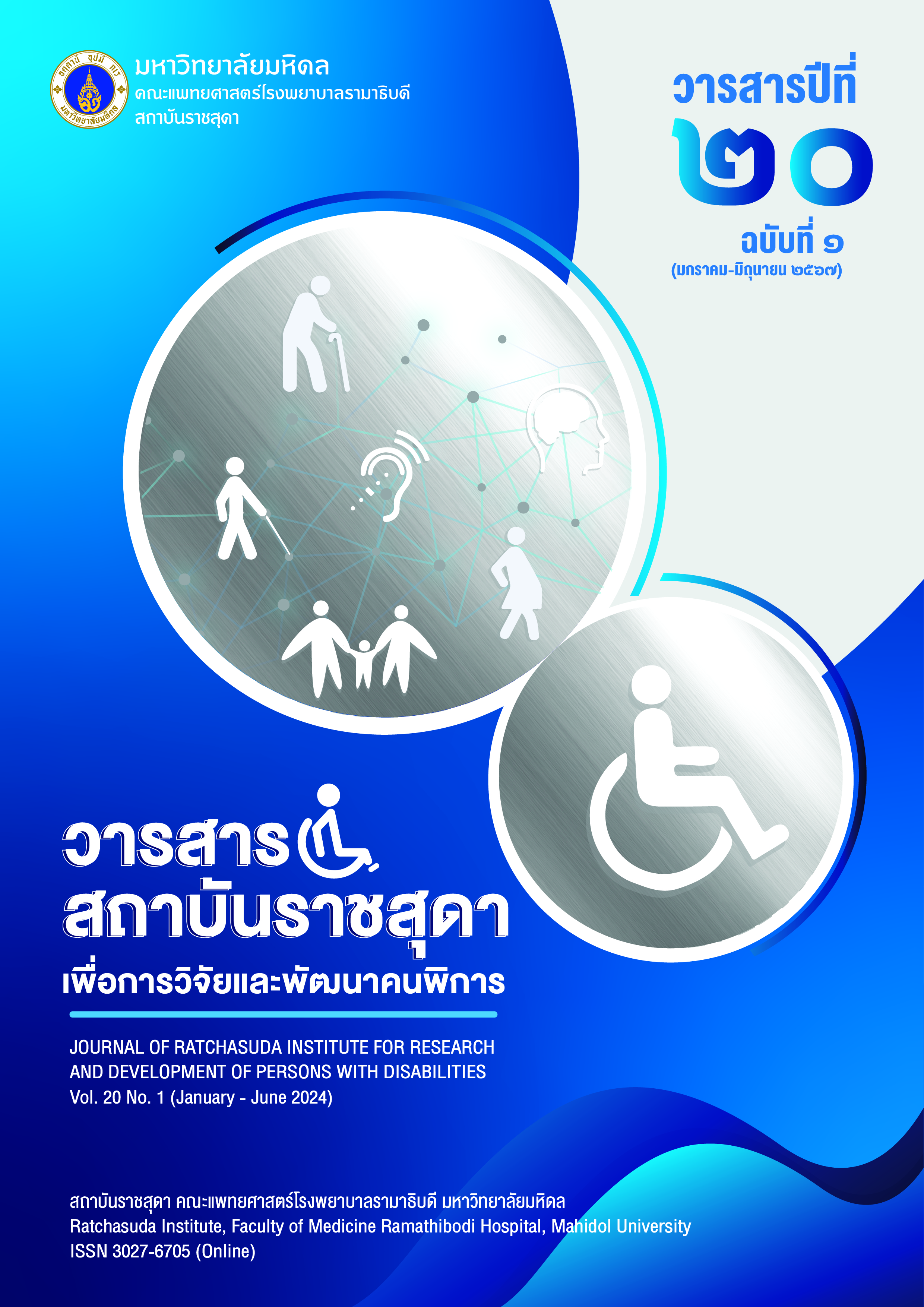Essential Characteristics of Teachers Teaching Students with Hearing Impairments in Thailand
Keywords:
Essential Characteristics of Teachers, Students with Hearing ImpairmentAbstract
Educating students with hearing impairment in Thailand is vital. In order to educating students with hearing impairment, having professional development for related staff who work with these students is essential because having high qualification staff would help these staff to perform more effective. The article aimed to study the essential characteristics of teachers teaching students with hearing impairment. This is qualitative research. The data were collected with in-depth interviews and a question guideline from the administrators and the teachers in the specialized schools for the hearing impaired. The sample consisted of 17 administrators and teachers who were ordinary teachers and hearing-impaired teachers. The schools representing each region were drawn by lottery. Also, the snowball technique was used. According to the findings, the essential characteristics of teachers teaching students with hearing impairment in Thailand were divided into 2 main characteristics: knowledge and skills. The knowledge characteristics were about the knowledge of psychology for the teachers, the other types of disabilities, and the basic education core curriculum as well as the school curriculum. However, the essential characteristics of skills consisted of Thai sign language, counseling, an Individualized Education Program (IEP), teaching materials for hearing impairment students, communication with parents, a variety of teaching methods, assessment of individual learning, and coordinating with external agencies.
Downloads
References
Aksornchuen, T. (2014). Strategic Management Deaf School of Thailand in the Next Decade. Veridian E-Journal, 7(2), 357-368.
Announcement of the Ministry of Education on Types and Criteria of Persons with Disabilities in Education B.E. 2552. (2009, June 8). Government Gazette. No.126 Special Section 80D. page 45-47. http://law.m-society.go.th/law2016/uploads/lawfile/20100210_15_14_27_7714.pdf
Boontongchun, J. & Srisopha, T. (2013). Quality of Work life of Personnel in Schools for the DeafUnder Jurisdiction of Special Education Bureau. SWU Educational Administration Journal. 12(23), 129-137.
Chaiwatthanakunwanit, S. (2015). A Proposed Guideline for Provision of Non-formal Education for Students with Hearing Impairments. Songkhla: Songkhla Rajabhat University.
Chaobantad, N. (2016). Developing a Guidelines of Educational Management of the Deaf Childhood for Deaf Schools in the Northeast. [Master’s Thesis, Mahasarakham university]. Thailis. https://tdc.thailis.or.th/tdc/search_result.php
Educational Provision for Persons with Disabilities Act, B.E. 2551. (2008, February 5). Government Gazette, No.125 Section 28A. page 1-13.
Engler, K. S., & MacGregor, C. J. (2018). Deaf Education Teacher Preparation: A Phenomenological Case Study of a Graduate Program with a Comprehensive Philosophy. American Annals of the Deaf, 162(5), 388-418.
Githaiga, D. N. (2018). Promoting Hearing Impaired Guidance and Counseling Programme. LAP Lambert Academic Publishing.
Janejitvanich, J., Srisurakul, T., Nuchpongsai, P., Chiengchana, N., & Klibthong, S. (2019). A need assessment of teachers’ knowledge and social support in education for children with special needs in special schools and inclusive schools in central region, Office of the basic education commission. Journal of Education Silpakorn University. 17(2). 104-114.
Musyoka, M. M., Gentry, M. A., & Meek, D. R. (2017). Perceptions of Teachers’ Preparedness to Teach Deaf and Hard of Hearing Students with Additional Disabilities: A Qualitative Case Study. Journal of Development & Physical Disabilities. 29, 827-848. doi:10.1007/s10882-017-9555-z
Office of the National Economic and Social Development Council. (2021). The National Economic and Social Development Plan: The Thirteenth Plan (2023-2027). https://www.nesdc.go.th/article_attach/article_file_20230307173518.pdf
Patjan, S., Ruannakarn, P., & Phusee-orn, S. (2019). The Current States, Strengths, Weakness, Opportuninties, and Treats of Learning and Teaching of Roi-Et School for the Deaf. Journal of Ratchasuda College for Research and Development of Persons with Disabilities. 15(2). 47-61
Plaewfueng, K. (2018). The Development of a Learning Model to Promote Reading Skills for Hearing Impaired Using Storytelling Picture Sign Language. [Doctoral’s Thesis, King Mongkut's University of Technology Thonburi]. Thailis. https://tdc.thailis.or.th/tdc/search_result.php
Songpracha, P., Maharka, P., & Srisurakul, T. (2020). The Environment Supporting Students’ Learning in School for the Deaf. Journal of Ratchasuda College for Research and Development of Persons with Disabilities. 16(1). 46-58.
Tinmala, D. (2018). Characteristics of Preservice Special Education Teachers and Education Policy in Thailand. Ratchaphruek Journal. 16(1). 1-14.

Downloads
Published
How to Cite
Issue
Section
License
Copyright (c) 2024 Journal Of Ratchasuda Institute for Research and Development of Persons With Disabilities

This work is licensed under a Creative Commons Attribution-NonCommercial-NoDerivatives 4.0 International License.
บทความที่ได้รับการตีพิมพ์เป็นลิขสิทธิ์ของวารสารสถาบันราชสุดาเพื่อการวิจัยและพัฒนาคนพิการ





